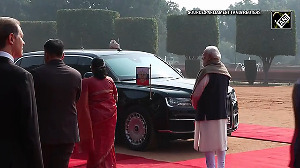'Had this conflict gone on at the pace that it was continuing, the use of ground forces would have been inevitable.'

While United States President Donald Trump has been patting himself for negotiating a cessation of hostilities between India and Pakistan, New Delhi has reiterated that Operation Sindoor is not over yet.
In his address to the nation on May 13, Prime Minister Narendra Modi laid out a new doctrine for responding to terrorism and said India will no longer differentiate between terrorists and the government sponsoring terrorism.
Modi declared that Operation Sindoor is the 'new normal' and India will give a befitting response to any terror attack by targeting terror havens in Pakistan.
How long then will the tense peace on the India-Pakistan border last?
"If there were to be peace, then the entire justification for the Pakistan army in its current form goes away," C Christine Fair, who has written multiple books on the Pakistan army and terrorist groups like the Lashkar-e-Tayiba, tells Rediff's Utkarsh Mishra.
The first of a two-part interview:
Prime Minister Modi told the nation that India will no longer see Pakistan's establishment and the terror emanating from its soil as separate.
He also stated that, for lasting peace, Pakistan must dismantle its terror infrastructure.
As someone who has closely studied why the Pakistan army and affiliated terror groups wage war against India, what do you think will be the impact of this new doctrine?
I don't think the doctrine is going to have much impact for a couple of reasons.
One, it's one thing to say that you're not going to distinguish between terrorists and the Pakistan army that supports them, but what we can actually see from the conflict that we're just coming out of -- and hopefully there's not going to be a resumption of conflict -- was that when India struck targets in the Punjab, it didn't have control of the escalation ladder.
It didn't have escalation dominance as it had expected. And Pakistan, as any analyst of the region would have told you, was going to respond in kind.
As this crisis escalated faster than any previous crisis, both went to the United States seeking a way out. It's not clear who came first, and I'm not sure that it matters who went first. The point of the matter is both sought an exit ramp from a conflict that was no longer in either's control.
Regarding Pakistan shutting down the terror camps, that's also not going to happen.
As I've said at length, and I am kind of tired of saying, both Jaish-e-Mohammed and Lashkar-e-Tayiba are really important tools of statecraft to the Pakistani State, which is, of course, dominated by the Pakistan army.
You are saying that it is not clear who went to the United States first. Over the past few days, the Pakistan army has made big claims of victory, including downing of multiple Indian fighter jets...
And they did. To be very clear, they probably did.
But several analysts have pointed out that since they agreed to a ceasefire unconditionally, it's a sign that their losses are significant and claims of victories are not true.
The people who are saying that are ignoramuses, and they don't understand conflict spirals.
Both countries have nuclear weapons. There's a point at which the use of nuclear weapons becomes dangerously probable.
Had this conflict gone on at the pace that it was continuing, the use of ground forces would have been inevitable. And this would have been an enormously escalatory point.

In your book on the Pakistan army, you highlight how it is an ideologically driven institution.
In fact, after the recent hostilities, the Pakistan army called its operation 'Marka-e-Haq'.
General Asim Munir also made some pointed remarks a few days ago.
Don't you think we often ignore this ideological bent when talking about peace between India and Pakistan -- that Pakistan's army will never allow peace due to its ideological commitment to conflict with India?
Well, that's why I wrote the book (laughs).
Because it's not in their material or their ideological interest for there to be peace between India and Pakistan.
If there were to be peace, then the entire justification for the Pakistan army in its current form goes away.
They wouldn't be able to be at the size that they are, they wouldn't be able to hog the resources as they do, and they wouldn't be able to control the State as they do.
The Pakistan army is ideologically but also materially vested in a conflict with India.
There are some really good examples of peacemaking that the Pakistan army had sabotaged.
Nawaz Sharif and (Atal Bihari) Vajpayee were on a process of peacemaking, and (Pervez) Musharraf sabotaged it with Kargil.
Whenever the prime ministers of India and Pakistan meet, you can count the days before there's a pretty significant terrorist attack in India.
I think I'm on a pretty solid empirical grounds when I say that the Pakistan army is very much vested in conflict. And when there does appear to be any modicum of rapprochement, they sabotage it.
- Part 2 of the Interview: 'If India Thinks It Has Deterred Pakistan, It Is Very, Very Mistaken'
- ALSO SEE: Operation Sindoor










